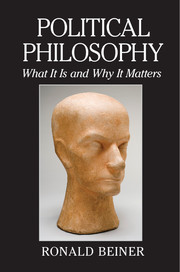Book contents
- Frontmatter
- Dedication
- Contents
- First Prologue: Horizons of Political Reflection
- Second Prologue: Freud, Weber, and Political Philosophy
- 1 Hannah Arendt: The Performativity of Politics
- 2 Michael Oakeshott: Life’s Adventure
- 3 Leo Strauss: The Politics of Philosophy
- 4 Karl Löwith: In Awe of the Cosmos
- 5 Excursus on Nature and History in the Strauss-Löwith Correspondence
- 6 Eric Voegelin: Modernity’s Vortex
- 7 Simone Weil: The Politics of the Soul
- 8 Hans-Georg Gadamer: Philosophy without Hubris
- 9 Jürgen Habermas: Politics as Rational Discourse
- 10 Michel Foucault’s Carceral Society
- 11 Alasdair MacIntyre: Fragmentation and Wholeness
- 12 Short Excursus on the Rise and Decline of Communitarianism as a Political Philosophy
- 13 John Rawls and the Death of Political Philosophy
- 14 Richard Rorty: Knocking Philosophy off Its Pedestal, or the Death of Political Philosophy Postmodernized
- Epilogue: On Not Throwing in the Towel
- Index
- References
2 - Michael Oakeshott: Life’s Adventure
Published online by Cambridge University Press: 05 August 2014
- Frontmatter
- Dedication
- Contents
- First Prologue: Horizons of Political Reflection
- Second Prologue: Freud, Weber, and Political Philosophy
- 1 Hannah Arendt: The Performativity of Politics
- 2 Michael Oakeshott: Life’s Adventure
- 3 Leo Strauss: The Politics of Philosophy
- 4 Karl Löwith: In Awe of the Cosmos
- 5 Excursus on Nature and History in the Strauss-Löwith Correspondence
- 6 Eric Voegelin: Modernity’s Vortex
- 7 Simone Weil: The Politics of the Soul
- 8 Hans-Georg Gadamer: Philosophy without Hubris
- 9 Jürgen Habermas: Politics as Rational Discourse
- 10 Michel Foucault’s Carceral Society
- 11 Alasdair MacIntyre: Fragmentation and Wholeness
- 12 Short Excursus on the Rise and Decline of Communitarianism as a Political Philosophy
- 13 John Rawls and the Death of Political Philosophy
- 14 Richard Rorty: Knocking Philosophy off Its Pedestal, or the Death of Political Philosophy Postmodernized
- Epilogue: On Not Throwing in the Towel
- Index
- References
Summary
The political philosophy unfolded in On Human Conduct certainly lacks nothing for radicalism. The core of Michael Oakeshott’s theorizing is the idea that, as the mandate of the modern state expands, the possibility of living life as the self-sufficient adventure it is meant to be contracts. On Human Conduct is above all a reflection on the nature of the state. It can hardly be an accident that Hobbes and Hegel, two of the figures within the canonical theory tradition who most deeply engaged Oakeshott intellectually, were also utterly preoccupied with the project of theorizing the state. There is no question that Oakeshott wants a severe constraining of the scope of state activity, but this view of the state would not have the philosophical character that it does if it were not tied to views about what it is to live life.
An ordinary sort of human life, such as we all must lead, is inhabiting and responding to a present composed of objects and happenings ... related to ourselves as the objects of our attention and concern.... Each of us occupies such a present as his own; it is a personal present.... My Venice is not your Venice, and this grove of trees, which to me now is a shelter from the rain or a place to play hide-and-seek, to another (or to me in different circumstances) may be a defence against soil erosion.
Oakeshott’s guiding conception comes out most clearly when he distinguishes between an association “of pilgrims, travelling to a common destination” and an association “of adventurers,” each wandering in a unique direction (p. 243). As individuals, we have a responsibility to respond reflectively to the worlds in which we find ourselves and to exert practical intelligence in comporting ourselves to those worlds of practical existence. An overactive state, for Oakeshott, is a clear sign that individuals are abdicating that responsibility or seeking ways to lessen the burden of exercising reflective intelligence. (More precisely, the problem is not an overactive state but a state that takes itself to be purposive at all.) When Oakeshott speaks of the “individual manqué” (p. 275), he implies a kind of duty to be the sort of individual who is not an individual manqué, and he urges us to repudiate visions of the state that (he thinks) encourage or facilitate such moral abdication.
- Type
- Chapter
- Information
- Political PhilosophyWhat It Is and Why It Matters, pp. 25 - 40Publisher: Cambridge University PressPrint publication year: 2014



